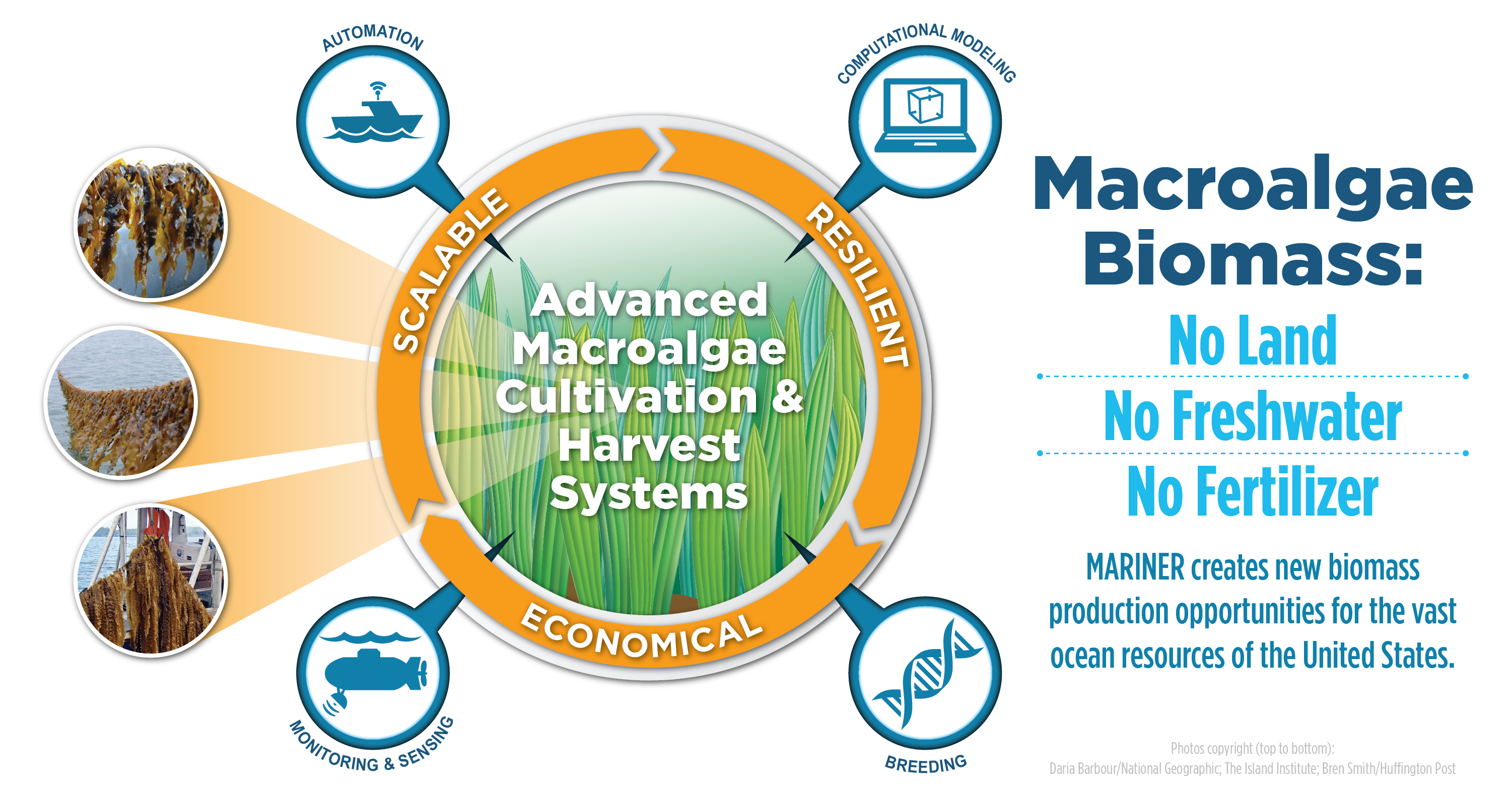MARINER
About the 2021 MARINER Annual Review Meeting
June 22nd, 23rd, & 24th, 2021
The goal of the MARINER (Macroalgae Research Inspiring Novel Energy Resources) program is to develop the critical tools that will allow the United States to grow into a world leader in the production of marine biomass. The program is supporting the development of a suite of technologies that will accelerate the deployment of advanced ocean farming systems, capable of sustainably delivering macroalgal biomass at a cost and volume competitive with terrestrial biomass feedstocks. The program focuses on demonstrating advanced cultivation technologies and tools that enable cost- and energy-efficient production of macroalgal biomass feedstock at a scale suitable for the production of fuels and chemicals. Offshore seaweed farms can also be part of a portfolio of solutions for nutrient remediation and carbon removal in our oceans. The challenge is to dramatically reduce the capital and operating cost of macroalgae cultivation, while significantly increasing the range of deployment by expanding into more exposed, off-shore environments. Since 2009 ARPA-E has funded over 60 million dollars of projects to spur innovation in the macroalgae industry. These focus on challenges across the seaweed spectrum; from producing biomass, to improving processing methodologies, and developing new markets.
This is the third annual review meeting for the MARINER program. The goal of this event is to, first, give the MARINER teams an opportunity to present updates on their projects and showcase their technical innovations and, second, to facilitate discussions between those teams and external stakeholders from across government, academia, and industry.
MARINER Program Categories
Cultivation & Harvest Systems
These projects are developing advanced farm systems that consider the lifecycle of macroalgae: from hatchery operations through cultivation and harvest. MARINER is supporting farms across the United States including Hawaii, Puerto Rico, New England, Alaska, and Southern California. In 2019 ARPA-E down-selected 6 teams for a Phase II that includes open-ocean testing of critical systems and components.
Numerical Modeling Tools
These projects are building new computational modelling tools that enable the design of advanced farm systems. These simulations can optimize the structure of new farms for the open-ocean, their biological performance, and the coupling between the two.
Remote Sensing & Monitoring Capabilities
Seaweed farmers need to be able to monitor their crop in real time to make decisions regarding seed attachment, plant health, and harvesting. To facilitate this teams are developing remote monitoring capabilities to quantify biomass quantity, health, and composition.
Advanced Breeding & Genomics
Maximizing the productivity of farms requires breed development to optimize plants traits such as yield and composition. These teams are working on genetics informed tools to accelerate innovation in macroalgal breeding.
Ecosystem Services & Nitrogen Extraction
One of the potential benefits of macroalgae is its capability to remove anthropogenic nitrogen from marine ecosystems. Teams are working to identify areas where seaweed could have a positive impact and develop validated methods for quantifying the nutrient uptake.
Seaweed Conversion
While MARINER initially focused on developing enabling technologies to cultivate biomass offshore, it is equally important to develop methodologies to process the cultivated product. ARPA-E is funding a team to leverage the microbiome of herbivorous fish to increase the efficacy of processing macroalgae.
Marine Spatial Planning & Lifecycle Assessment
Mapping the regions where macroalgae cultivation can be carried out at energy-relevant scale and understanding the lifecycle emissions of the farms is critical to scaling up offshore seaweed cultivation. ARPA-E is working with NOAA to develop tools for marine spatial planning and Argonne National Laboratory (ANL) to develop a macroalgae module for the widely used LCA model GREET.

